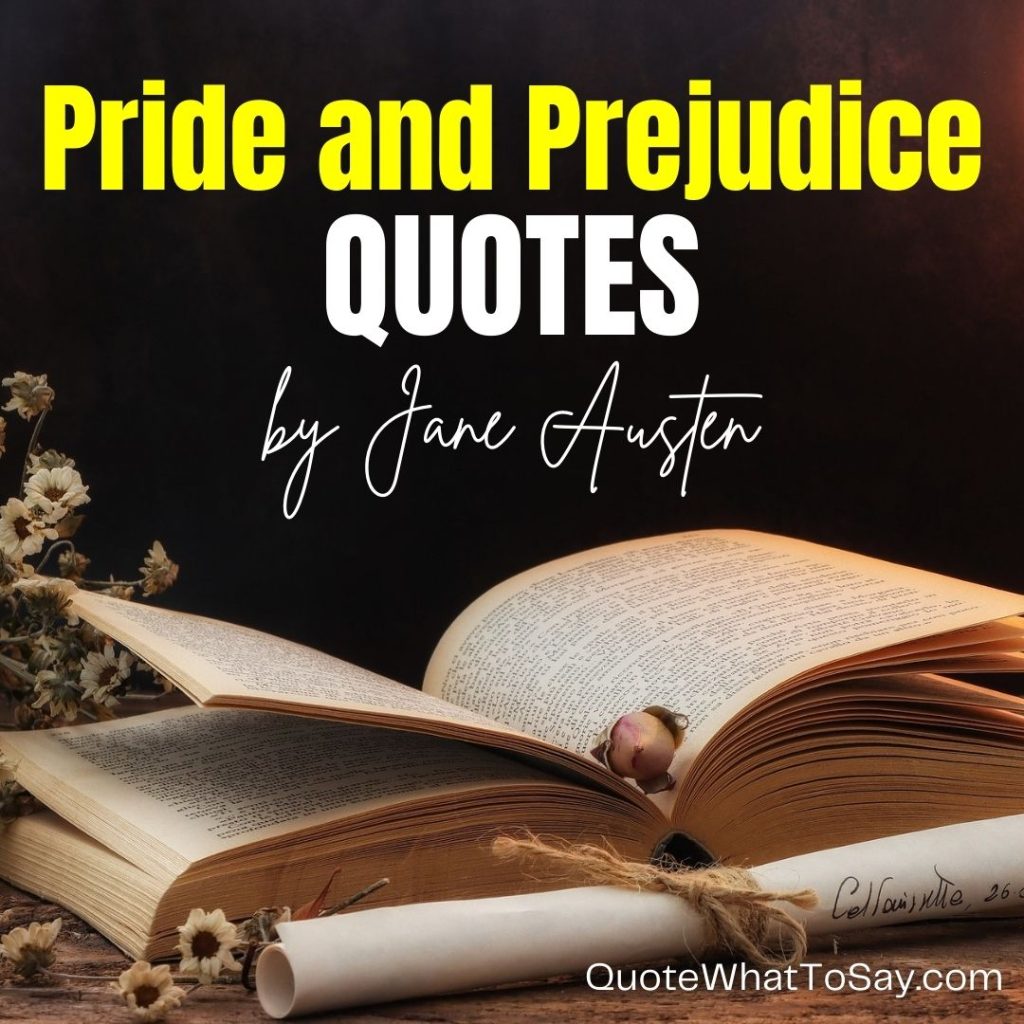Pride and Prejudice by Jane Austen is one of the most beloved novels in English literature, celebrated for its wit, romance, and keen social commentary.
Set in the early 19th century, the story revolves around Elizabeth Bennet and her complicated relationship with the wealthy, seemingly aloof Mr. Darcy. Austen’s prose is full of memorable quotes that capture the nuances of love, marriage, class, and life.
These quotes not only enhance the story but have also left a lasting impact, resonating with readers across generations.

Pride and Prejudice Quotes: Page Numbers and Editions
According to National Library of Scotland, there are different editions and adaptations of Pride and Prejudice, with page numbers may vary by editions with different pagination. Examples:
- The first edition, from 1813
- The first illustrated edition, from 1833
- The ‘Peacock’ edition from 1894 with Hugh Thomson’s illustrations
- R W Chapman’s Clarendon Press edition from 1923
- Editions published to tie in with film and television adaptations
Pride and Prejudice Quotes – Love, Marriage, Family, Life.
From Mr. Darcy’s famous declaration of love to Elizabeth’s reflections on personal pride and prejudice, the novel’s quotes offer insight into the characters’ inner lives and the social norms of Austen’s time.
Each quote captures a memorable or impactful moment from the novel:
- “It is a truth universally acknowledged, that a single man in possession of a good fortune, must be in want of a wife.” — Narrator, Chapter 1
- “She is tolerable, but not handsome enough to tempt me.” — Mr. Darcy, Chapter 3
- “To be fond of dancing was a certain step towards falling in love.” — Narrator, Chapter 3
- “I am in no humor at present to give consequence to young ladies who are slighted by other men.” — Mr. Darcy, Chapter 3
- “I could easily forgive his pride, if he had not mortified mine.” — Elizabeth Bennet, Chapter 5
- “Vanity and pride are different things, though the words are often used synonymously.” — Mary Bennet, Chapter 5
- “Nothing is more deceitful than the appearance of humility.” — Mary Bennet, Chapter 5
- “Happiness in marriage is entirely a matter of chance.” — Charlotte Lucas, Chapter 6
- “I am only resolved to act in that manner, which will, in my own opinion, constitute my happiness.” — Elizabeth Bennet, Chapter 6
- “We are all fools in love.” — Charlotte Lucas, Chapter 6
- “A lady’s imagination is very rapid; it jumps from admiration to love, from love to matrimony in a moment.” — Mr. Darcy, Chapter 6
- “I am excessively diverted.” — Elizabeth Bennet, Chapter 6
- “If a woman is partial to a man, and does not endeavor to conceal it, he must find it out.” — Elizabeth Bennet, Chapter 6
- “There is, I believe, in every disposition, a tendency to some particular evil.” — Elizabeth Bennet, Chapter 6
- “Every impulse of feeling should be guided by reason.” — Mary Bennet, Chapter 7
- “The power of doing anything with quickness is always prized much by the possessor.” — Mary Bennet, Chapter 7
- “A woman must have a thorough knowledge of music, singing, drawing, dancing, and the modern languages.” — Caroline Bingley, Chapter 8
- “The country is a vast deal pleasanter, is it not, Mr. Bingley?” — Mrs. Bennet, Chapter 9
- “A woman is partial to a man who flatters her.” — Mr. Bennet, Chapter 9
- “A person who can write a long letter with ease, cannot write ill.” — Mr. Darcy, Chapter 10
- “My good opinion once lost, is lost forever.” — Mr. Darcy, Chapter 11
- “I declare after all there is no enjoyment like reading!” — Caroline Bingley, Chapter 11
- “How pleasant it is to spend an evening in this way!” — Caroline Bingley, Chapter 11
- “There is a mixture of servility and self-importance in his letter, which promises well.” — Elizabeth Bennet, Chapter 13
- “Laugh as much as you choose, but you will not laugh me out of my opinion.” — Elizabeth Bennet, Chapter 17
- “It is your turn to say something now, Mr. Darcy.” — Elizabeth Bennet, Chapter 18
- “It is particularly incumbent on those who never change their opinion, to be secure of judging properly at first.” — Elizabeth Bennet, Chapter 18
- “I am perfectly serious in my refusal.” — Elizabeth Bennet, Chapter 19
- “I am not romantic, you know. I never was.” — Charlotte Lucas, Chapter 22
- “Do anything rather than marry without affection.” — Jane Bennet, Chapter 24
- “A girl likes to be crossed in love now and then.” — Mr. Bennet, Chapter 24
- “Next to being married, a girl likes to be crossed in love a little now and then.” — Mr. Bennet, Chapter 24
- “There are few people whom I really love, and still fewer of whom I think well.” — Elizabeth Bennet, Chapter 24
- “The more I see of the world, the more I am dissatisfied with it.” — Elizabeth Bennet, Chapter 24
- “What are men to rocks and mountains?” — Elizabeth Bennet, Chapter 27
- “We neither of us perform to strangers.” — Mr. Darcy, Chapter 31
- “The distance is nothing when one has a motive.” — Elizabeth Bennet, Chapter 32
- “You could not have made me the offer of your hand in any possible way that would have tempted me to accept it.” — Elizabeth Bennet, Chapter 34
- “In vain have I struggled. It will not do. My feelings will not be repressed.” — Mr. Darcy, Chapter 34
- “You must allow me to tell you how ardently I admire and love you.” — Mr. Darcy, Chapter 34
- “What a shame, for I dearly love to laugh.” — Elizabeth Bennet, Chapter 34
- “You are too hasty, sir. I am by no means done.” — Elizabeth Bennet, Chapter 34
- “Till this moment I never knew myself.” — Elizabeth Bennet, Chapter 36
- “People themselves alter so much, that there is something new to be observed in them forever.” — Elizabeth Bennet, Chapter 40
- “Angry people are not always wise.” — Jane Bennet, Chapter 40
- “One cannot be always laughing at a man without now and then stumbling on something witty.” — Elizabeth Bennet, Chapter 40
- “I am perfectly convinced by it that Mr. Darcy has no defect.” — Jane Bennet, Chapter 40
- “One has all the goodness, and the other all the appearance of it.” — Elizabeth Bennet, Chapter 40
- “If a woman conceals her affection with the same skill from the object of it, she may lose the opportunity.” — Elizabeth Bennet, Chapter 40
- “I am determined that nothing but the very deepest love could induce me into matrimony.” — Elizabeth Bennet, Chapter 55
- “There is a stubbornness about me that never can bear to be frightened at the will of others.” — Elizabeth Bennet, Chapter 56
- “For what do we live, but to make sport for our neighbors, and laugh at them in our turn?” — Mr. Bennet, Chapter 57
- “I can no longer help thanking you for your unexampled kindness to my poor sister.” — Elizabeth Bennet, Chapter 57
- “You have bewitched me, body and soul, and I love, I love, I love you.” — Mr. Darcy, Chapter 58
- “You are too generous to trifle with me.” — Elizabeth Bennet, Chapter 58
- “I have been a selfish being all my life, in practice, though not in principle.” — Mr. Darcy, Chapter 58
- “You must learn some of my philosophy. Think only of the past as its remembrance gives you pleasure.” — Elizabeth Bennet, Chapter 58
Summary of Pride and Prejudice Novel
Pride and Prejudice by Jane Austen is a novel that explores the themes of love, marriage, social class, and personal growth.
Set in early 19th-century England, the story centers on the Bennet family, particularly the relationship between Elizabeth Bennet and Mr. Fitzwilliam Darcy. Elizabeth, the second of five Bennet sisters, is intelligent, witty, and skeptical of the upper class, while Mr. Darcy is wealthy, reserved, and initially perceived as arrogant.
The novel begins with Mr. Bingley, a wealthy young man, moving into the neighborhood, sparking interest and excitement. Bingley quickly takes a liking to Jane Bennet, Elizabeth’s elder sister.
Meanwhile, Darcy’s initial pride and Elizabeth’s prejudice lead to tension between them. Elizabeth initially disdains Darcy, especially after hearing unfavorable rumors about him and learning of his interference in Jane’s romance with Bingley. However, as Elizabeth gets to know Darcy and learns more about his character, her feelings toward him shift.
Through misunderstandings, societal pressures, and personal revelations, both Elizabeth and Darcy learn to look beyond their first impressions. Elizabeth realizes Darcy’s true, honorable character, while Darcy overcomes his pride and prejudice against Elizabeth’s lower social standing.
In the end, their mutual respect, understanding, and love triumph, leading to a happy marriage. Austen’s novel highlights the importance of honesty, compassion, and self-reflection in relationships, making Pride and Prejudice a timeless classic.





No Responses